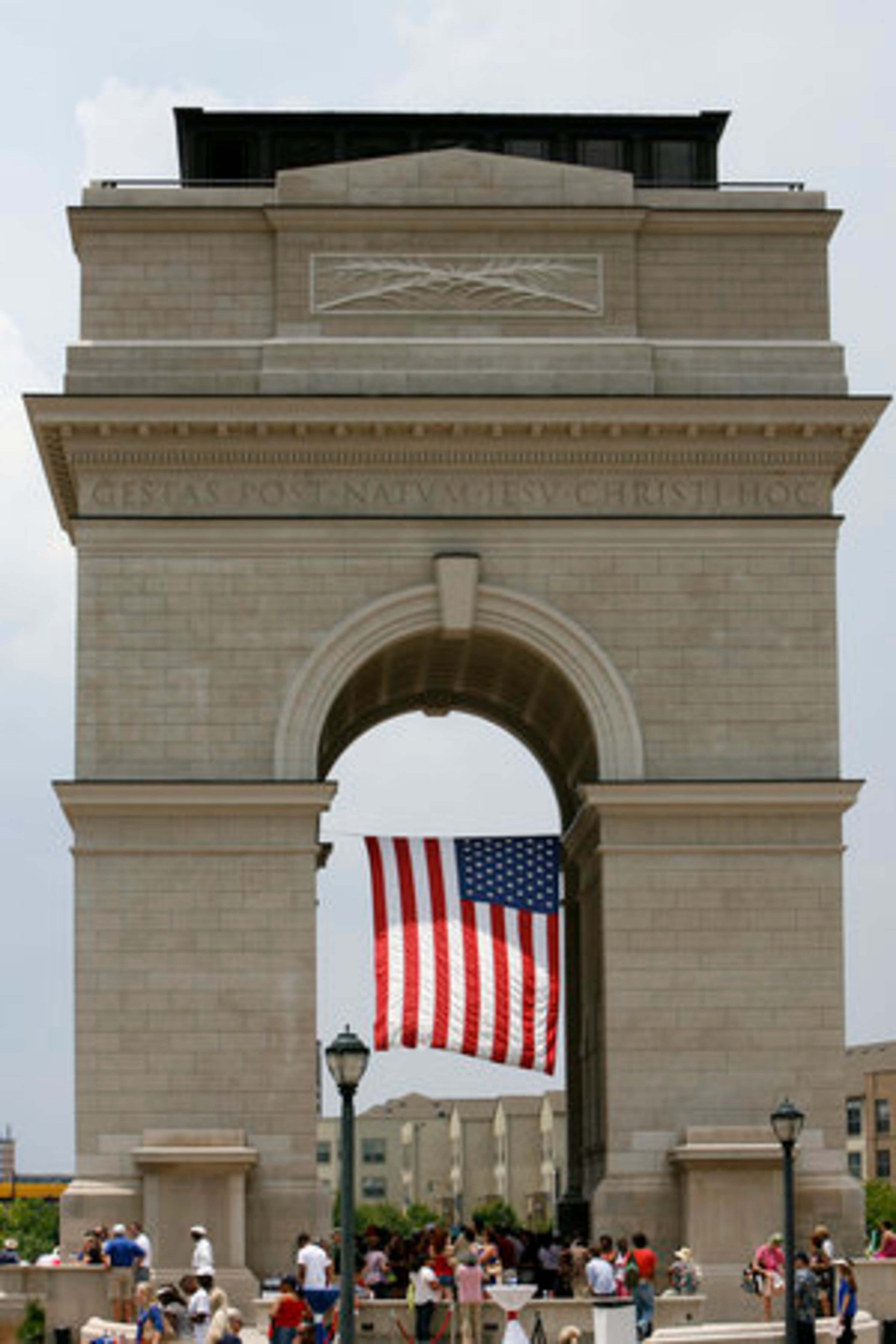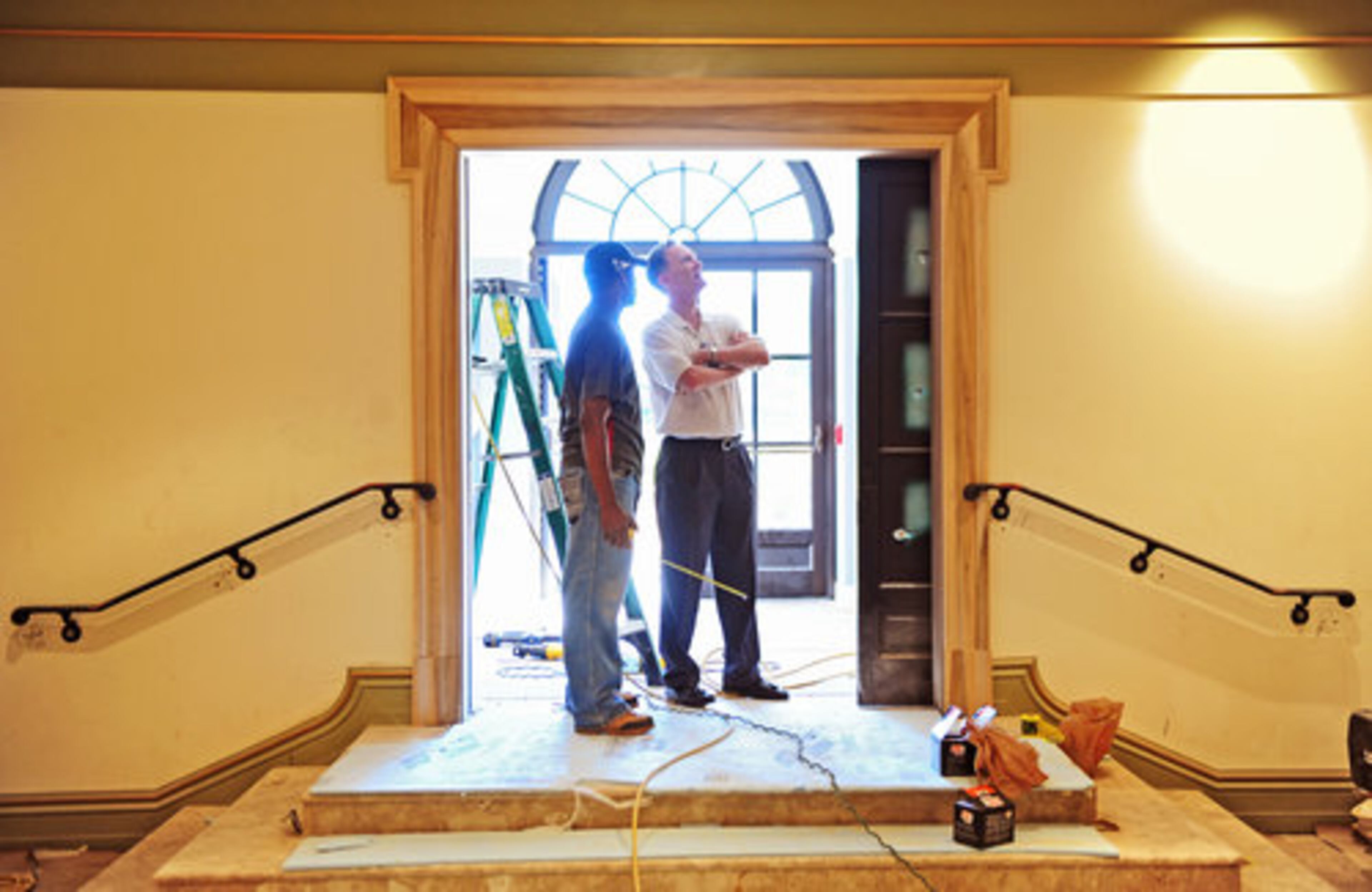
Rodney Cook Jr. is proud of his ancestors, the Mims family, who came to Atlanta before the Civil War and produced two mayors. But there's another part of the family history that some of his relatives aren't as proud of.
"We were loyalists," Cook says. "We opposed secession. Azariah Mims helped Sherman's troops. They destroyed his house anyway."
Cook is standing on the grand steps of his neoclassical mansion in Buckhead. The family, it seems, has recovered nicely. Even so, the unpleasantness of 1864 remains an uncomfortable legacy for some of his kin.
"We don't talk about it much," he says. "It's complicated."
History buff's dream
Cook has spent considerable time musing on those complications lately. For one thing, he had to decide whether to mention his family's loyalties in the new Millennium Gate Museum, set within the 82-foot classical arch he built at Atlantic Station. The largest monument ever erected in Atlanta, it's scheduled to open on the Fourth of July.

The museum promises to be an idiosyncratic mélange of local history. There will be displays about colonial Georgia, the Atlantic Steel mill that formerly occupied the site, and 20 pioneer families who helped build Atlanta — including Cook's. (Yes, those Yankee collaborators in the attic will be mentioned.)
The museum also will include a reproduction of a living room from the Pink House, a Buckhead estate once owned by Cook's in-laws and designed by his hero, architect Philip Shutze. And there will be something called Philanthropy Theater, which, despite the fusty name, is an interactive display developed by Georgia Tech that will allow visitors to zoom around wall-size images of the city and activate pop-up boxes about the impact of charitable wealth.
What could these disparate elements possibly have in common?
Just this: They reflect Cook's world view, as surely as if he were greeting visitors from a wing chair in the lobby.
The 52-year-old designer grew up in Buckhead during the civil rights turmoil of the 1960s, when Mayor Ivan Allen Jr. and others were making Atlanta's reputation as a city too busy to hate. Cook inhaled the example of public-minded patricians doing the right thing. He believes in noblesse oblige.
In his museum, he says, "I wanted to tell a chamber of commerce story, a God-bless-Atlanta story. But other people convinced me that we needed to include some other things."
Some negative things.
At least one thing, however, proved too close for comfort.
Birth of a tribute
Milo Pinckney, an Atlanta health care executive, was having breakfast at a Savannah inn when he met a courtly gentleman who introduced himself with an unusual calling card. "I'm building a museum," the man said.
After he got to know him, Pinckney gave Rodney Cook $10,000 — even though the Pinckneys come from New York and have nothing to do with Atlanta history.

"When someone has this much passion for something," he explains, "it's hard not to support him."
The Millennium Gate cost $15 million. Cook financed the private undertaking with about 150 contributions from companies, foundations and families, some of them old Atlanta names that will be lauded in the museum's Pioneers Gallery.
One of the largest donors has a direct link to the site. Tom Glenn, whose grandfather was president of Atlantic Steel, supported the project through the Wilbur and Hilda Glenn Family Foundation, which he heads. The museum will include a reproduction of his forebear's office.
"This isn't a vanity thing," Glenn says. "That museum is a demonstration of the Atlanta spirit."
Another donor helped Cook sell the project in the African-American community.
Lovette Russell, whose husband is CEO of the H.J. Russell construction company, persuaded her father-in-law, the founder, to contribute $100,000. She also advised Cook that the museum should mention troublesome chapters of the city's history, such as the 1906 Atlanta Race Riot.
"I didn't want it to be all roses and no issues," she says.
The Russells are one of four African-American families to make the Pioneers Gallery, along with the Herndons (Atlanta Life Insurance), the Scotts (the Atlanta Daily World) and the Dobbs-Jacksons, whose tree includes black leader John Wesley Dobbs and his grandson, Maynard Jackson, the city's first black mayor.
"I felt a personal obligation to support this out of respect to Maynard and his grandfather," says Valerie Jackson, the mayor's widow.
Cook sought involvement from Jewish Atlantans as well. Three familiar names will appear in the Pioneers Gallery: the Rich family (of Rich's department store), the Seligs (real estate) and the Massells (who produced the city's only Jewish mayor, Sam Massell).

Cook also asked for advice from the Breman Jewish Heritage Museum, which suggested he include the 1915 lynching of Leo Frank. He followed that counsel.
"We have an image of poor Mr. Frank hanging there," he says. "You know, his head almost came off."
A labor of love
When he discusses Atlanta history — the good and the bad — Cook can become, as they say in Yiddish, a little verklempt. One morning at his house, talking about the death of the Rev. Martin Luther King Jr., his eyes fill with tears, and he has to stop to compose himself.
"I didn't intend this to be a Barbara Walters interview," he apologizes.
His emotions, Cook later explains, stem from boyhood memories of his father, now retired and living in North Carolina.
Rodney Cook Sr. was a Republican legislator who supported civil rights at a time when most white Georgians did not. He was one of the few lawmakers who supported Julian Bond when the state House refused to seat him because of his anti-war beliefs. Cook also spoke out against the Peyton Road barricade, a clumsy attempt by the city to keep a white neighborhood and a black neighborhood separate.
After his views were publicized, the Klan burned a cross on the Cooks' lawn in Buckhead. Rodney and his sisters received death threats at school.
"This museum is very personal for him," says Kennesaw State University historian Catherine Lewis, who coordinated the exhibits.

Cook approached the Atlanta History Center for help and was referred to Lewis, who curates exhibitions there. From their first conversation, she could see that the museum was his baby.
"I wouldn't call myself the curator," she says. "It's not my interpretation. Rodney chose the pictures and rewrote the text. My job was to help him tell the story he wanted to tell. He's the curator."
Drawing to completion
This spring, as workers were finishing the Millennium Gate, Cook faced a delicate curatorial question about one of the families extolled in his museum. It was delicate because it concerned his in-laws.
According to a new book, James W. English, the revered patriarch of his wife's family, was the largest user of forced convict labor in Georgia during the late 1800s. "Slavery by Another Name," Atlanta journalist Douglas Blackmon called the practice in his title.
As Cook well knew, English was more than an ancestor; it was his wife's middle name, the name they gave their first child.
Captain English, as he was known, was a Confederate veteran who prospered in Atlanta after the Civil War, becoming mayor in the 1880s and later founding the institution that became the First National Bank of Atlanta (now part of Wachovia).
The basis of English's wealth, Blackmon writes, was the Chattahoochee Brick Co., which leased hundred of convicts from the state and put them to work under brutal conditions making bricks used in everything from the federal penitentiary to the homes of Inman Park. Most of the prisoners were black; many had been arrested on bogus charges. Some were traded and sold in scenes the author likens to antebellum slave markets.
Blackmon, a former Journal-Constitution reporter who is The Wall Street Journal's Atlanta bureau chief, felt honor-bound to contact English's family to ask whether it had wrestled with this history. He called the most prominent living descendant, James D. Robinson III, a former chairman of American Express, who referred the matter to his son-in-law.
Cook met Blackmon for lunch and made it clear he didn't accept the premise that English had exploited defenseless men. He produced a 1900s newspaper article that painted a benign picture of the brickyard, with workers playing baseball and enjoying ice cream at dinner.
Blackmon pointed to 1908 legislative hearings in which witnesses told of frequent whippings. English pleaded ignorance in his testimony. Soon after the proceedings, Georgia ended convict leasing and replaced it with a reform that became infamous itself: the chain gang.
In the interest of full disclosure, Blackmon suggested, shouldn't the museum mention English's use of forced labor along with his many accomplishments?
"We have only 12,000 square feet, and we don't have to include everything," Cook replied. He said convict labor might be a more appropriate subject for Atlanta's proposed human rights museum.
Cook concedes that parts of Georgia history don't look very nice to modern eyes.
"That was an awful period, a black scar on the soul of the nation," he says of the decades after the Civil War. "We were barely removed from anarchy."
But he remains unapologetic about the Captain.
"I believe that James English was a great man." He pauses and then adds, "Incidentally, he's no relation of mine. That's my wife's family. But he's not here to defend himself, so I will."
English is cited several times in the museum, always in a favorable light. As for the convict labor allegations, visitors will have to look a little harder. Cook told Blackmon he would be willing to sell his book in the Millennium Gate shop.
Cook's reasoning? "It's part of history."

